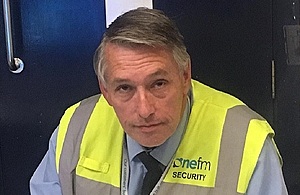The Welsh Secretary has written to the head of the Army in Wales to thank him for the support provided by the UK Armed Forces across the country in the continued fight against coronavirus.
Simon Hart MP wrote to Brigadier Andrew Dawes CBE, Commander of 160th (Welsh) Brigade this week to commend the Armed Forces for their work in tackling the pandemic. Full-time soldiers and Reservists have been deployed in a variety of roles across Wales at the request of the civilian authorities to support different parts of the response to the coronavirus emergency.
The deployments have included driving and decontaminating ambulances for the Welsh Ambulance Services NHS Trust (WAST), building beds in Ysbyty Calon Y Ddraig (the Dragon’s Heart Hospital) and advising and assisting NHS Wales to distribute essential PPE to frontline staff.
The Armed Forces have also helped set up dozens of testing centres across Great Britain, including in Llandudno. Soldiers are now collecting swabs for critical workers in Mobile Testing Units across Wales, helping to rapidly expand the UK’s testing capability.
Secretary of State for Wales Simon Hart said:
The UK’s Armed Forces are providing crucial support to our NHS, Welsh Ambulance Service and social care workers, helping critical care to continue across Wales.
Their continued efforts, alongside that of our extraordinary key workers, is testament to their selfless commitment to our country. I would like to extend my thanks to the Armed Forces personnel, and those they are working alongside, who are doing incredible work to keep our country going during these difficult times.
The support our soldiers and Reservists have provided in Wales shows, once again, that we are better tackling the coronavirus united across the four nations of the UK and making the best use of our shared resources.
Minister for the Armed Forces James Heappey:
Our Armed Forces are proud to continue to work alongside the emergency services, local councils and the NHS to support communities across Wales.
From testing, to distributing PPE to driving ambulances, our Armed Forces are demonstrating their versatility, expertise and willingness to assist in whatever way the people of Wales need.
Armed forces support to tackle COVID-19 in Wales includes:
Welsh Ambulance Service
The Army has boosted its support to the Welsh Ambulance Services NHS Trust (WAST). A deployment of 30 soldiers have been trained in ambulance decontamination, in addition to the initial 60 tasked with driving ambulances at the beginning of April.
British Army provides logistics advice to NHS Wales
A logistics specialist supply team from The 4th Regiment, Royal Logistics Corp of the British Army has been deployed to assist NHS Wales in PPE distribution. The 30-person strong team has helped refine the essential equipment’s distribution over 16 hospitals across seven regional health boards by providing logistical advice and training additional staff. A military mentoring and advisory team has also been deployed to assist with distribution of medical equipment across the country in order to best match demand.
Military unload PPE flown into Cardiff airport
Around 30 Reservists from 3 Royal Welsh unloaded vital supplies of PPE that was flown into Cardiff airport from Cambodia and China. The Reservists were on hand to unload 2 million pieces of PPE for use by frontline health and care workers in Wales.
Oxygen distribution
A military assistance team to assess vacuum insulated evaporator systems across NHS Wales to ensure oxygen supplies are where they are needed. Soldiers from each of the three services were trained to drive oxygen tankers at the Air Products facility in Port Talbot in order to support the NHS.
Planning
Military planning and liaison personnel have deployed across Wales, including at the Welsh Government’s Emergency Coordination Centre in Cardiff, the four Local Resilience Fora and the seven Local Health Boards.
Development of field hospitals and testing sites
Military Assessment Teams have supported the NHS in Wales’ development of field hospitals, including at the Principality Stadium in Cardiff. There are also a total of seven testing centres across Wales involving military personnel as well as an increasing number of Mobile Testing Units.

